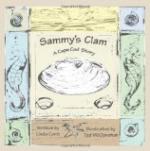But the manager took hold of her arm. He’d been looking at the crowd, and I cal’late he saw that here was the chance for the best kind of an advertisement. He whispered in her ear. Next thing I knew she clasped her hands together, let out a scream and runs up and grabs the celebrated British poet round the neck.
“Booth!” says she. “My husband! Saved! Saved!”
And she went all to pieces and cried all over his necktie. And then Marks trots up the child, and that young one hollers: “Papa! papa!” and tackles Hank around the legs. And I’m blessed if Montague don’t slap his hand to his forehead, and toss back his curls, and look up at the sky, and sing out: “My wife and babe! Restored to me after all these years! The heavens be thanked!”
Well, ’twas a sacred sort of time. The town folks tiptoed away, the men looking solemn but glad, and the women swabbing their deadlights and saying how affecting ’twas, and so on. Oh, you could see that show would do business that night, if it never did afore.
The manager got after Jonadab and me later on, and did his best to pump us, but he didn’t find out much. He told us that Montague belonged to the Uncle Tom’s Cabin Company, and that he’d disappeared a fortni’t or so afore, when they were playing at Hyannis. Eva was his wife, and the child was their little boy. The bloodhounds knew him, and that’s why they chased him so.
“What was you two yelling ‘Stop thief!’ after him for?” says he. “Has he stole anything?”
We says “No.”
“Then what did you want to get him for?” he says.
“We didn’t,” says Jonadab. “We wanted to get rid of him. We don’t want to see him no more.”
You could tell that the manager was puzzled, but he laughed.
“All right,” says he. “If I know anything about Maggie—that’s Mrs. Schmults—he won’t get loose ag’in.”
We only saw Montague to talk to but once that day. Then he peeked out from under the winder shade at the hotel and asked us if we’d told anybody where he’d been. When he found we hadn’t, he was thankful.
“You tell Petey,” says he, “that he’s won the whole pot, kitty and all. I don’t think I’ll visit him again, nor Belle, neither.”
“I wouldn’t,” says I. “They might write to Maudina that you was a married man. And old Stumpton’s been praying for something alive to shoot at,” I says.
The manager gave Jonadab and me a couple of tickets, and we went to the show that night. And when we saw Booth Hank Montague parading about the stage and defying the slave hunters, and telling ’em he was a free man, standing on the Lord’s free soil, and so on, we realized ’twould have been a crime to let him do anything else.
“As an imitation poet,” says Jonadab, “he was a kind of mildewed article, but as a play actor—well, there may be some that can beat him, but I never see ’em!”




